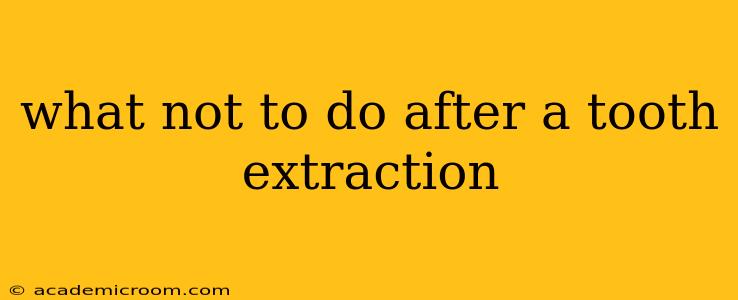Losing a tooth, whether through extraction or accident, is a significant event. Proper post-extraction care is crucial for preventing complications and ensuring a smooth healing process. This guide details the critical things to avoid after a tooth extraction to promote optimal recovery.
What Not to Do Immediately After Tooth Extraction
The first few hours after a tooth extraction are critical. Here's what to absolutely avoid:
-
Don't Rinse Vigorously: While gentle rinsing is encouraged (with salt water, as we'll discuss later), vigorous rinsing or spitting can dislodge the blood clot forming in the extraction site. This clot is vital for healing and its dislodgement can lead to a painful and potentially serious complication called dry socket.
-
Don't Smoke: Smoking significantly increases the risk of dry socket and impedes healing. The suction created by smoking can dislodge the blood clot, and the chemicals in tobacco further irritate the wound.
-
Don't Touch the Extraction Site: Avoid touching or probing the extraction site with your tongue or fingers. This can introduce bacteria and disrupt the healing process.
-
Don't Use a Straw: Similar to smoking, using a straw creates suction that can dislodge the blood clot.
-
Don't Drink Through a Straw: Avoid sucking on anything that creates a vacuum in your mouth.
-
Don't Eat Hard Foods: Give your mouth time to heal. Avoid crunchy, hard, or chewy foods that could irritate or reopen the extraction site. Soft foods are recommended initially.
-
Don't Drink Alcohol: Alcohol can thin the blood, increasing bleeding and slowing down the healing process. It's best to avoid alcohol for at least 24 hours, and ideally longer.
What Not to Do in the Days Following Tooth Extraction
The healing process continues for several days. Here are some further precautions:
-
Don't Engage in Strenuous Activity: Avoid strenuous exercise or activities that increase blood pressure. This can lead to increased bleeding and discomfort.
-
Don't Skip Your Medications: Follow your dentist's instructions regarding pain medication and antibiotics (if prescribed). Taking medication as directed is essential for managing pain and preventing infection.
-
Don't Neglect Oral Hygiene (But Do It Carefully): Maintain good oral hygiene, but be gentle. Avoid brushing directly over the extraction site for the first few days. Rinse gently with saltwater (1/4 teaspoon salt in 8 ounces of warm water) several times a day.
-
Don't Ignore Warning Signs: Pay close attention to any unusual pain, excessive bleeding, swelling, or signs of infection (e.g., fever, pus). Contact your dentist immediately if you notice anything concerning.
What to Do Instead:
Instead of the things mentioned above, prioritize these actions:
-
Rest: Give your body time to heal. Get plenty of rest in the days following your extraction.
-
Eat Soft Foods: Opt for soft, nutritious foods like soup, yogurt, mashed potatoes, and applesauce.
-
Apply Ice Packs: Applying ice packs to the outside of your cheek can help reduce swelling.
-
Take Prescribed Medication: Follow your dentist's instructions carefully.
-
Gentle Rinsing with Salt Water: This helps keep the area clean and promotes healing.
How Long Does it Take to Heal After a Tooth Extraction?
The healing time varies depending on the complexity of the extraction. Simple extractions usually heal within a week or two, while more complex extractions may take longer. However, complete healing, including bone regeneration, can take several months.
When Should You Call Your Dentist After a Tooth Extraction?
Contact your dentist immediately if you experience:
- Excessive bleeding (more than slight oozing)
- Severe pain that doesn't respond to medication
- Signs of infection (fever, swelling, pus)
- Dry socket (intense pain in the extraction site)
By following these guidelines and paying close attention to your body's signals, you can significantly improve your chances of a smooth and comfortable recovery after a tooth extraction. Remember, your dentist is your best resource for personalized advice and care.
